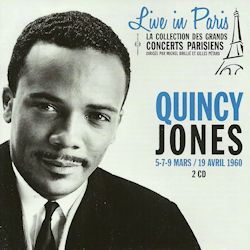CD1
1. Chinese Checkers
2. Sunday Kind of Love
3. Air Mail Special
4. Parisian Thoroughfare
5. The Phantom’s Blues
6. Lester Leaps In
7. I Remember Clifford
8. Moanin’
9. Doodlin’
10. The Gypsy
11. Big Red
12. Birth of a Band
13. Walkin’
14. Air Mail Special (alternate bonus track)
15. I Remember Clifford (alternate bonus track)
CD2
1. The Preacher
2. Birth of a Band
3. My Reverie
4. Ghana
5. Cherokee
6. Pleasingly Plump
7. Stockholm Sweetening
8. Tickle Toe
9. Blues in the Night
10. Our Love is Here to Stay
11. Doodlin’
12. Ghana (alternate bonus track)
13. Whisper Not
14. Birth of a Band (alternate bonus track)
15. Lester Leaps In (alternate bonus track)
Quincy Jones – Bandleader, arranger
Leonard Johnson, Benny Bailey, Floyd Standifer – Trumpet
Clark Terry – Flugelhorn, trumpet, vocals
Jimmy Cleveland, Ake Persson, Melba Liston, Quentin Jackson – Trombone
Julius Watkins – French Horn
Porter Kilbert, Phil Woods – Alto sax
Jerome Richardson, Budd Johnson – Tenor sax
Sahib Shihab – Baritone sax
Patti Bown – Piano
Les Spann – Flute, guitar
Buddy Catlett – Bass
Joe Harris – Drums
In 1957 Quincy Jones went to Paris, where he studied with the composer Nadia Boulanger. While there, he was given various jobs, including leading a band
for the musical Free and Easy by Harold Arlen & Johnny Mercer. The show didn’t win many performances, so Quincy took the band on tour and
arranged some concerts in Paris in March 1960 at the Barclay Hoche Studio. These concerts only drew small crowds, but further concerts in April at the
Olympia Theatre drew a bigger audience.
All this background is necessary to explain this double album, which consists of 26 tracks recorded at the Barclay Hoche Studio and four (tracks 1 to 4 of
the second CD) at the Olympia Theatre. The band was a star-studded ensemble containing many famous names, such as Phil Woods, Clark Terry, Jerome
Richardson and Budd Johnson. The thin audiences at the Barclay Hoche Studio are clear from the flimsy applause, but there is a genial air about these
recordings, as you can hear the band laughing and exchanging jokes in the way that jazz musicians do.
Despite the happy atmosphere of the March 1960 recordings, the music generally lacks a spark, and the band sometimes sounds under-rehearsed. Yet there are
quite a few brilliant ensemble passages, many of them with the distinctive features of a Quincy Jones arrangement. And there are some entertaining solos as
well. Clark Terry is sensitive in I Remember Clifford and puckish on Moanin’. Les Spann contributes inventive flute solos to both
versions of Doodlin’. The second version includes one of Clark Terry’s humorously incomprehensible blues vocals. The Gypsy is a splendid
feature for Phil Woods’ alto sax, although Melba Liston’s feature on My Reverie suffers from several faults. Sahib Shihab’s baritone sax is
superbly agile in both takes of Ghana. The recorded sound is generally good but occasionally fuzzy - and the announcements for each song are
strangely distant.
Mystifyingly, there are only four tracks from the April 1960 concerts at the Olympia Theatre, lasting a total of less than 18 minutes. Tracks 12, 14 and 15
of this CD are alternate cuts which may come from the Olympia concerts. Weirdly, track 13 is listed as an alternate bonus track even though there is no
other version of it on the album. At any rate, the larger audience at the Olympia helps the musicians get into their stride and they sound more integrated.
Quincy Jones was a masterly arranger whose later work displayed commendable invention and precision. This album shows him at an early stage when he was
still developing his writing. It is interesting to hear him and his band at this exploratory stage.
Tony Augarde
www.augardebooks.co.uk
